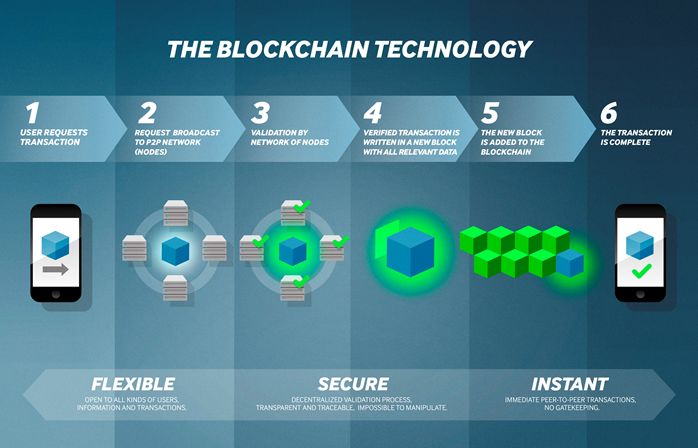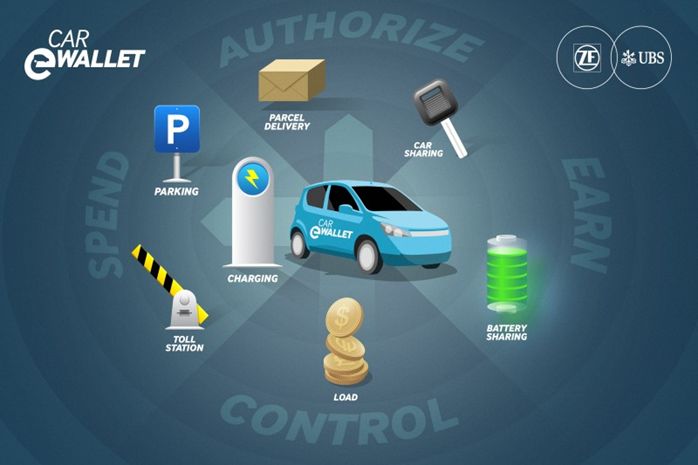 各大公司都已经设想了各种可以应用“车上交易”的场景,比如电池充电收费等。而正是采埃孚 eWallet 电子钱包等服务提供的安全数据传输,让这些应用成为可能。(图片来源:采埃孚)
各大公司都已经设想了各种可以应用“车上交易”的场景,比如电池充电收费等。而正是采埃孚 eWallet 电子钱包等服务提供的安全数据传输,让这些应用成为可能。(图片来源:采埃孚) 区块链技术可以将用户数据加密为一条条匿名但可永久保存的记录。
区块链技术可以将用户数据加密为一条条匿名但可永久保存的记录。 我们可以基于区块链技术生成的加密数据,通过“车上支付”实现快速安全的交易。
我们可以基于区块链技术生成的加密数据,通过“车上支付”实现快速安全的交易。
网联功能如今是新车中普及最快的特性之一,各大企业也已从中发现商机,希望可以利用车辆网联功能产生的数据,提供更多服务并增加公司收入。然而,此类这些市场真正成型必须有个前提数——据公司和车主都必须首先确信,车辆的数据完整性能够得到保证。
今年4月在底特律举行的 SAE WCX 18 全球汽车年会上,Aras Corp 公司的 William Bone 提到:“首先,数据质量必须得到保证。如果没法保证质量,你就卖不出去。这些数据必须具有真正意义、能够真正发挥作用,且得到大家的信任。一些具有可追溯性的相关数据具有很大价值。”
区块链前来助阵?
其他 WCX 大会演讲嘉宾提出,为了解决数据质量的问题,正在高速发展的区块链技术可能是一种可行的解决方案。由于经常与一些“灰色”加密货币联系在一起,区块链技术的确引起了一些怀疑,但事实上,这项技术已经开始在银行业等领域有所应用,主要用于确保数据在使用时不会被篡改。区块链可以长期保证数据的完整性,全面覆盖车辆的完整使用周期(通常为十多年),因此一些希望发展车辆数据业务的公司已将区块链技术视为一种可行的解决方案。
“我们需要找一些简单的方法来监测数据,”风河系统公司(Wind River Systems)的 Peter Brown 说,“一些基于区块链技术的解决方案可以覆盖车辆的生命周期,人们需要了解数据没有被篡改。”
区块链技术已经进入部分供应商的计划中:汽车供应商采埃孚、UBS 和 IBM 已经合作开发了一个开放汽车支付平台——Car eWallet 汽车电子钱包,可以让车辆直接进行收付款,而且采埃孚还展示了一种让汽车用 eWallet付款的新概念——当车辆完成自动停车后,车上人员就可以直接下车离开,而eWallet 可以自动支付停车费用。eWallet 解决方案应用了 IBM 的区块链技术,这可以将同一个网络中每个用户的信息同步至一些可靠且不可篡改的数据记录中。
所有参与者的信任
这些保护行技术必须在车辆的完整使用寿命期内证实数据的完整性。然而,这种对完整性的要求并不仅止于数据,购买信息的公司必须向提供数据的车主证明自己。
如果供应商想要建立一个真正稳健的互联车辆数据市场,则首先必须确保消费者能够信任所有有权限访问自己数据的公司。车主肯定要有充分的理由和动机,才会选择加入一些供应商的数据收集项目,而且必须充分信任这些数据收集者。在这种环境下,如果媒体经常报道一些数据滥用或非法使用的案例,那车主就不会愿意参加数据收集项目。
“消费者最在乎的永远是‘到底有什么好处’及‘到底要付出什么代价’,”CCC 信息服务公司的 Andreas Hecht 说,“长期以来,业界一直都未能很好地解释,他们到底会用客户数据做什么。”
Connectivity, one of the fastest-growing technical features for new vehicles, has attracted the attention of many companies that hope to offer services and garner revenue by using data from vehicles. But before any market can emerge, data companies and vehicle owners will have to believe that data integrity is ensured.
“The quality of data must be there,” William Bone of Aras Corp said at the recent SAE WCX 18 conference in Detroit. “If it can’t be trusted, you can’t sell it. It has to be something that can be understood and used, and people must believe that they can trust it. There’s a lot of value in data that's traceable and relevant.”
Blockchain to the rescue?
Other WCX speakers suggested fast-developing blockchain technology may provide a solution. Though blockchain’s association with murky cryptocurrencies has created some skepticism, the technology is seeing expanding use in banking and other fields that want to ensure data is not tampered with as it’s used. Blockchain’s ability to ensure data integrity over the decade-plus lifetime of vehicles has many eyeing it as a possible solution for those who build marketing plans around vehicle data.
“We need to find some simple way to monitor data,” said Peter Brown of Wind River Systems. “There may be some blockchain-type solution that will cover the lifecycle of the vehicle. People need to know the data has not been tampered with.”
Block chain already features in some suppliers’ plans; auto-supplier ZF, UBS and IBM teamed up to create Car eWallet, an open automotive-transaction platform that enables vehicles to make and accept payments—and ZF has demonstrated the concept with a vehicle that pays for charging and tolls using eWallet. And while vehicles park themselves autonomously as occupants go about their business, eWallet can automatically pay for parking. The program employs IBM blockchain technology, which makes it possible to synchronize the information of each user in a network in a reliable and unchangeable data record.
Trust for all involved
Protective technologies will have to certify data integrity over the lifetime of the vehicle. However, integrity must go beyond the data. The companies that buy the information will have to prove themselves to the vehicle owners who provide data.
If suppliers want to build a strong market for data from connected vehicles, they’re going to have to make sure that consumers trust all the companies that gain access to their data. Vehicle owners will have to see some reason to opt in to data-collection plans and they’ll have to trust the data aggregators. If media reports highlight abuses or questionable uses, vehicle owners will be understandably reluctant to authorize many data-collection programs.
“For consumers, it’s always about the balance between what they’re giving and getting,” said Andreas Hecht of CCC Information Services. “The industry has done a poor job of explaining what happens with their data.”
Author: Terry Costlow
Source: SAE Automotive Engineering Magazine
等级
打分
- 2分
- 4分
- 6分
- 8分
- 10分
平均分
- 作者:Terry Costlow
- 行业:汽车
- 主题:质量、可靠性与耐久性安全性
